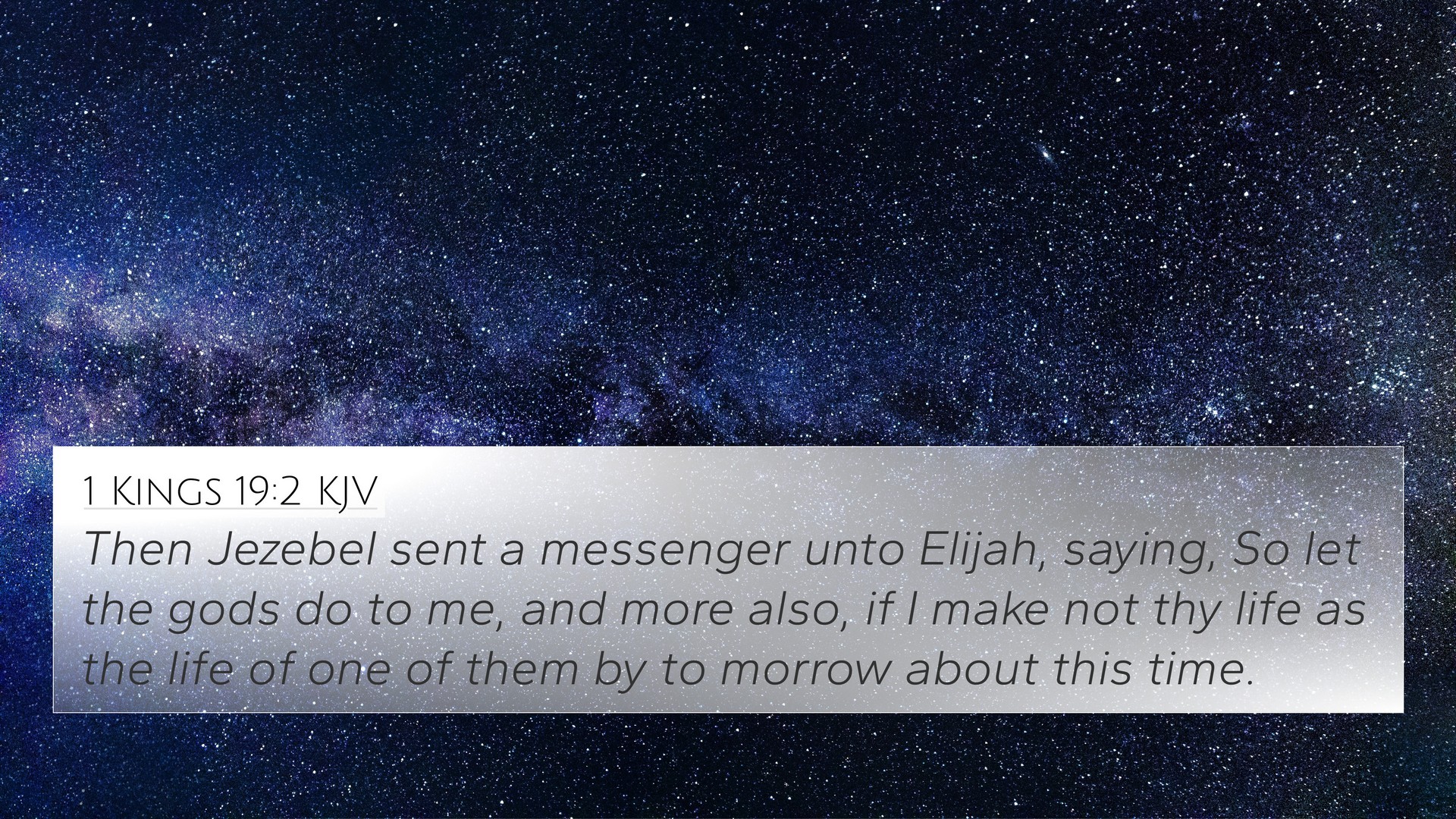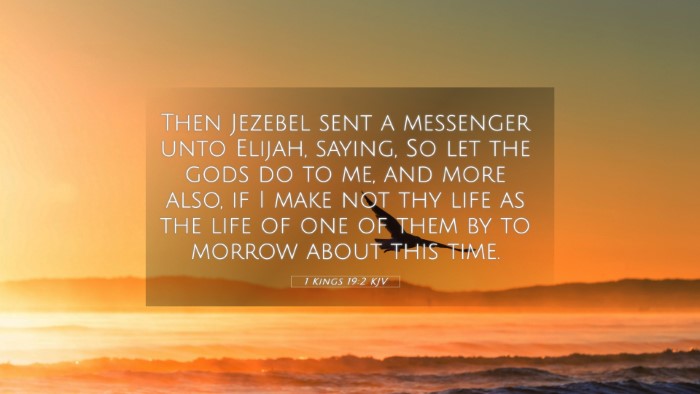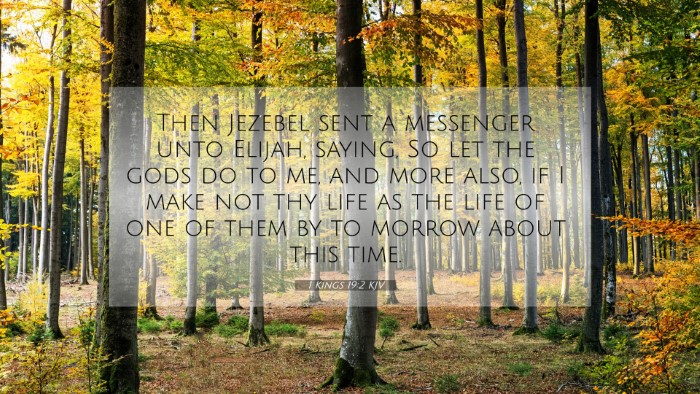Old Testament
Genesis Exodus Leviticus Numbers Deuteronomy Joshua Judges Ruth 1 Samuel 2 Samuel 1 Kings 2 Kings 1 Chronicles 2 Chronicles Ezra Nehemiah Esther Job Psalms Proverbs Ecclesiastes Song of Solomon Isaiah Jeremiah Lamentations Ezekiel Daniel Hosea Joel Amos Obadiah Jonah Micah Nahum Habakkuk Zephaniah Haggai Zechariah Malachi1 Kings 19:2 Similar Verses
1 Kings 19:2 Cross References
Then Jezebel sent a messenger unto Elijah, saying, So let the gods do to me, and more also, if I make not thy life as the life of one of them by to morrow about this time.
Uncover the Rich Themes and Topics of This Bible Verse
Listed below are the Bible themes associated with 1 Kings 19:2. We invite you to explore each theme to gain deeper insights into the Scriptures.
1 Kings 19:2 Cross Reference Verses
This section features a detailed cross-reference designed to enrich your understanding of the Scriptures. Below, you will find carefully selected verses that echo the themes and teachings related to 1 Kings 19:2 KJV. Click on any image to explore detailed analyses of related Bible verses and uncover deeper theological insights.
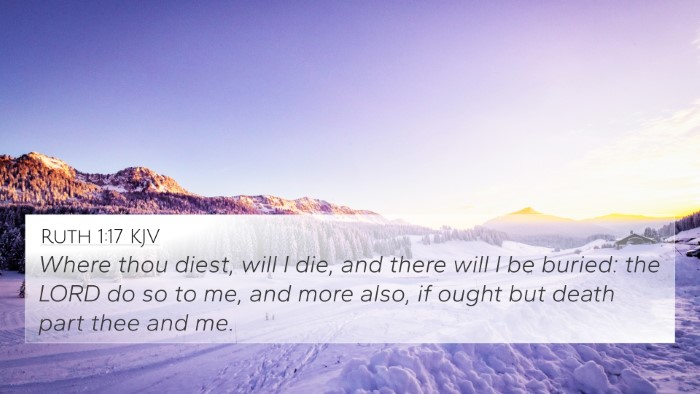
Ruth 1:17 (KJV) »
Where thou diest, will I die, and there will I be buried: the LORD do so to me, and more also, if ought but death part thee and me.
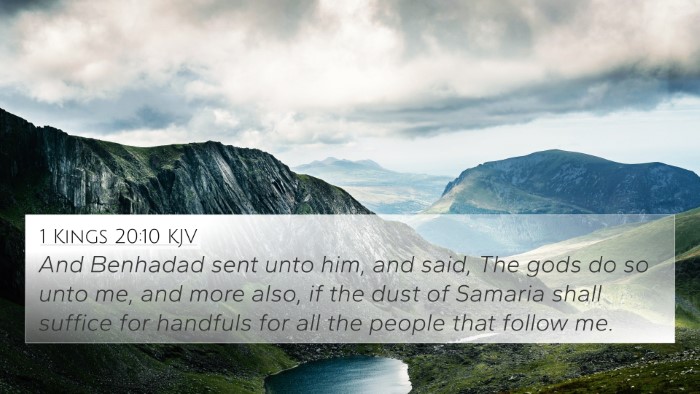
1 Kings 20:10 (KJV) »
And Benhadad sent unto him, and said, The gods do so unto me, and more also, if the dust of Samaria shall suffice for handfuls for all the people that follow me.
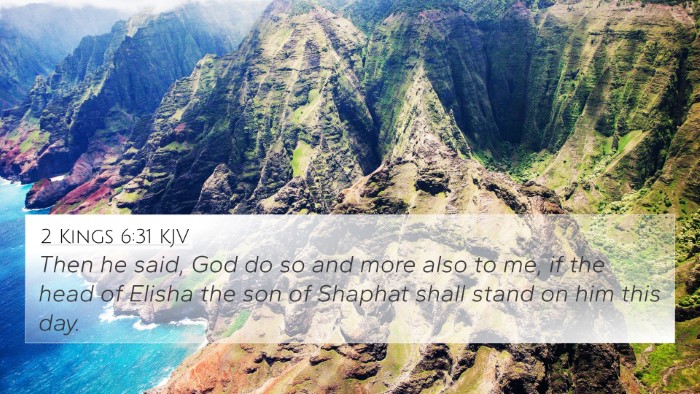
2 Kings 6:31 (KJV) »
Then he said, God do so and more also to me, if the head of Elisha the son of Shaphat shall stand on him this day.
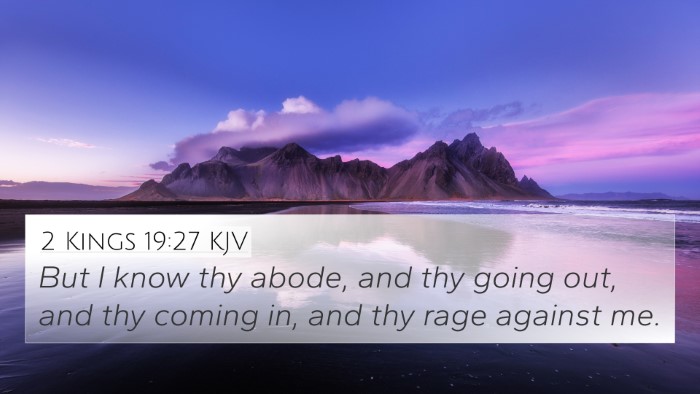
2 Kings 19:27 (KJV) »
But I know thy abode, and thy going out, and thy coming in, and thy rage against me.
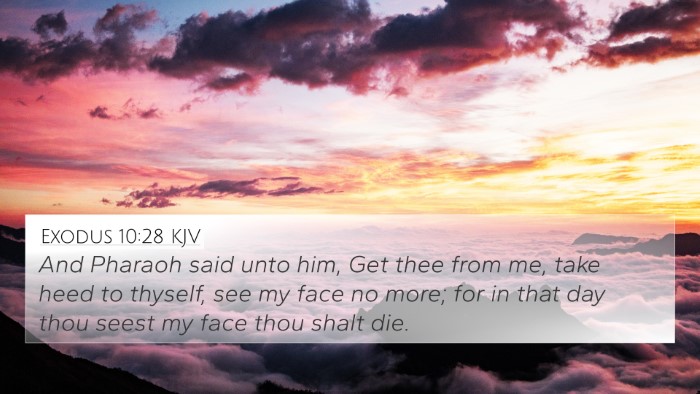
Exodus 10:28 (KJV) »
And Pharaoh said unto him, Get thee from me, take heed to thyself, see my face no more; for in that day thou seest my face thou shalt die.
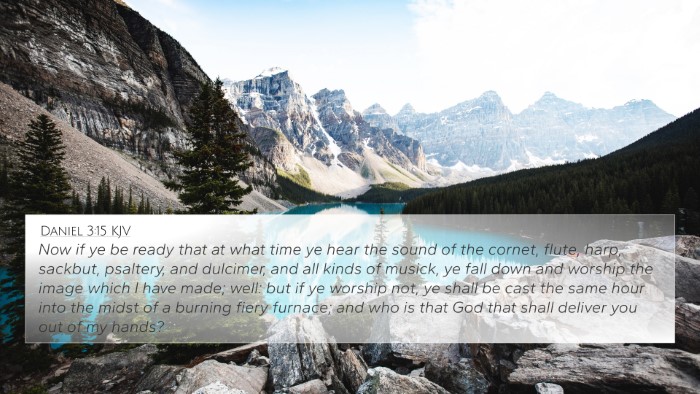
Daniel 3:15 (KJV) »
Now if ye be ready that at what time ye hear the sound of the cornet, flute, harp, sackbut, psaltery, and dulcimer, and all kinds of musick, ye fall down and worship the image which I have made; well: but if ye worship not, ye shall be cast the same hour into the midst of a burning fiery furnace; and who is that God that shall deliver you out of my hands?
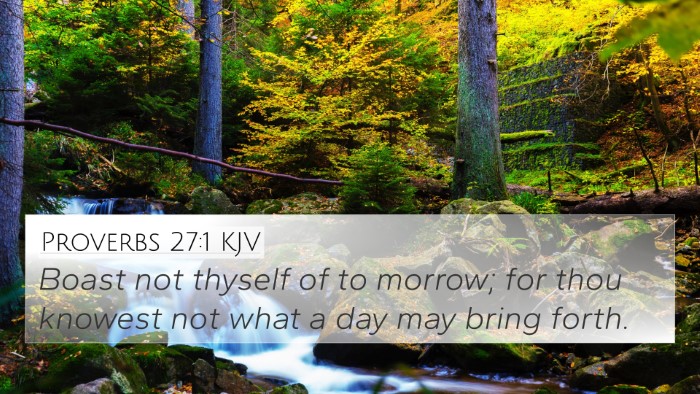
Proverbs 27:1 (KJV) »
Boast not thyself of to morrow; for thou knowest not what a day may bring forth.
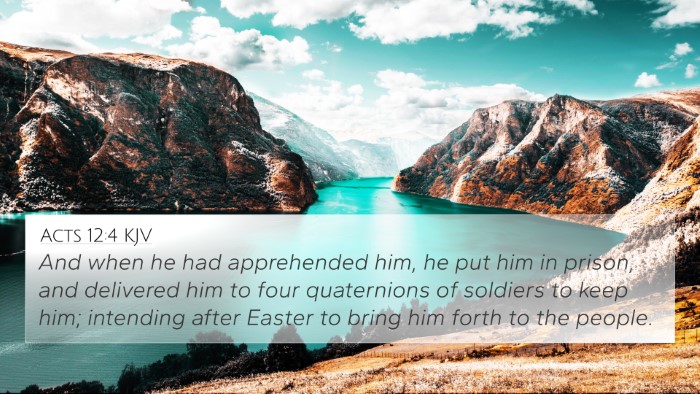
Acts 12:4 (KJV) »
And when he had apprehended him, he put him in prison, and delivered him to four quaternions of soldiers to keep him; intending after Easter to bring him forth to the people.
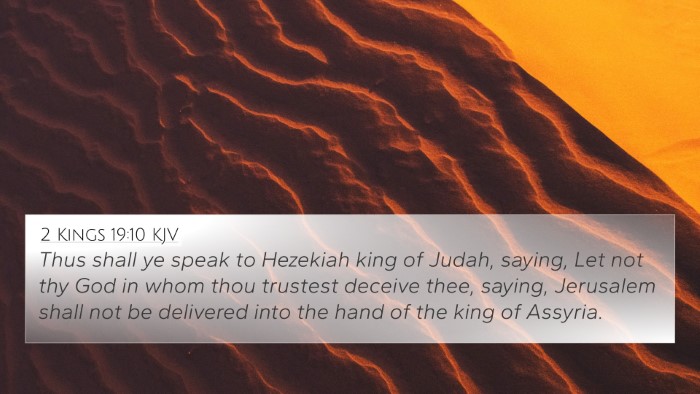
2 Kings 19:10 (KJV) »
Thus shall ye speak to Hezekiah king of Judah, saying, Let not thy God in whom thou trustest deceive thee, saying, Jerusalem shall not be delivered into the hand of the king of Assyria.
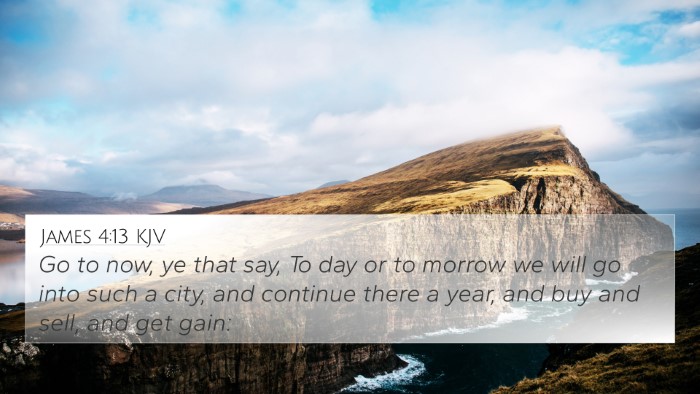
James 4:13 (KJV) »
Go to now, ye that say, To day or to morrow we will go into such a city, and continue there a year, and buy and sell, and get gain:
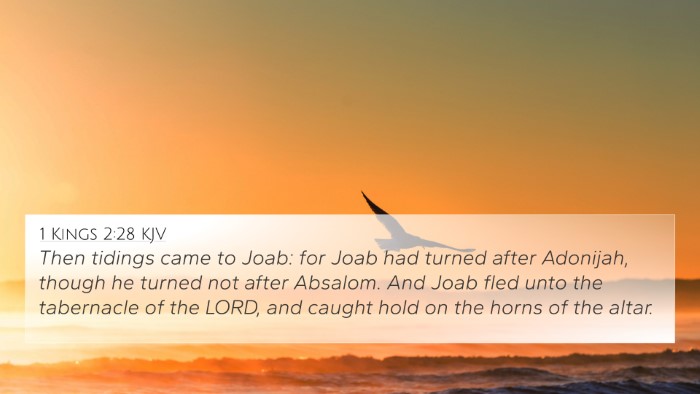
1 Kings 2:28 (KJV) »
Then tidings came to Joab: for Joab had turned after Adonijah, though he turned not after Absalom. And Joab fled unto the tabernacle of the LORD, and caught hold on the horns of the altar.
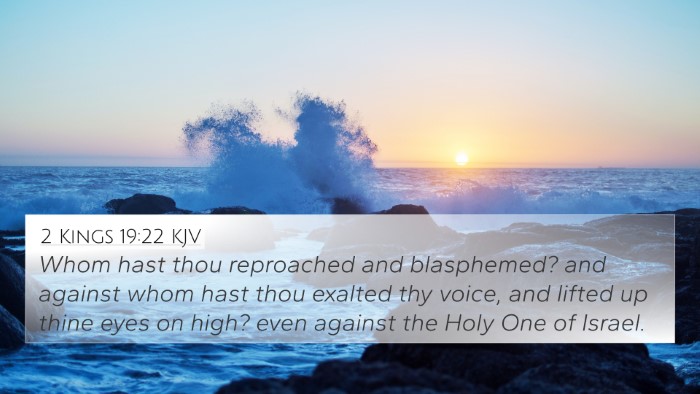
2 Kings 19:22 (KJV) »
Whom hast thou reproached and blasphemed? and against whom hast thou exalted thy voice, and lifted up thine eyes on high? even against the Holy One of Israel.
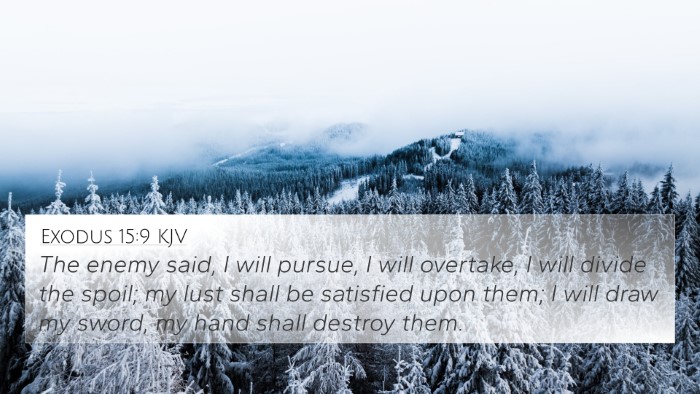
Exodus 15:9 (KJV) »
The enemy said, I will pursue, I will overtake, I will divide the spoil; my lust shall be satisfied upon them; I will draw my sword, my hand shall destroy them.
1 Kings 19:2 Verse Analysis and Similar Verses
Understanding 1 Kings 19:2
The verse 1 Kings 19:2 states: "Then Jezebel sent a messenger to Elijah, saying, 'So let the gods do to me, and more also, if I do not make your life as the life of one of them by tomorrow about this time.'"
This verse features the powerful Queen Jezebel issuing a direct threat against the prophet Elijah after his triumph over the prophets of Baal on Mount Carmel. The context of this verse highlights the ongoing struggle between the prophets of Yahweh and the worshippers of false gods in Israel.
Context and Significance
This passage occurs immediately after Elijah's great victory where fire from heaven had consumed his sacrifice, proving the might of the true God over Baal’s non-response. Now, we see a turn in narrative tone; Elijah is confronted with peril despite his victory.
Commentary Insights
-
Matthew Henry's Commentary:
Henry notes the abrupt shift from triumph to fear. He suggests that amid significant victories, the vulnerability of God's servants is often exposed. Here, Jezebel represents human opposition to divine will, showing that the faithful may face threats from those empowered by positions of authority.
-
Albert Barnes' Commentary:
Barnes emphasizes the boldness of Jezebel's threat, rooted in her commitment to the Baal religion. He asserts that Jezebel sought to intimidate Elijah by invoking a curse upon herself if she failed to exact revenge. This illustrates the spiritual conflict at play between the prophets of God and idolatry.
-
Adam Clarke's Commentary:
Clarke explains the cultural ramifications of Jezebel's threat, emphasizing the role of women in authority during this time. He notes that her remarks displayed both a personal vendetta and a public commitment to promoting the worship of Baal above Yahweh, showcasing the broader implications of political and religious strife.
Bible Cross-References
This verse can be connected to several other Bible verses that help to illustrate its themes and deepen our understanding of its significance:
- 1 Kings 18:20-40: This passage recounts Elijah’s confrontation with the prophets of Baal, setting the stage for Jezebel's vengeful response.
- Exodus 22:20-24: This outlines the severe consequences of leading Israel into idolatry, echoing the kind of judgment Jezebel faced.
- 1 Kings 21:25: This verse describes Jezebel's wickedness and cunning, further establishing her role in promoting Balaam worship.
- Matthew 10:28: Jesus’ reminder not to fear those who can kill the body, but rather the one who can destroy both body and soul, resonates with Elijah’s fear.
- James 5:17: References Elijah’s prophetic ministry, indicating his struggles and the power of fervent prayer amidst threats.
- Romans 8:31: Reminds believers that if God is for us, who can be against us, encouraging the faithful to stand firm like Elijah.
- Revelation 2:20: Speaks of Jezebel in a New Testament context as a symbol of false teachings and influences that corrupt God’s people.
Thematic Connections
This verse embodies themes of fear, authority, and spiritual warfare. The motif of opposition persists throughout the scriptures, as seen in the connections between Elijah and other biblical figures facing adversity, such as David's encounters with King Saul and Daniel’s trials in Babylon.
Moreover, the spirit of fear that gripped Elijah after such a national victory mirrors common human experiences of doubt following moments of divine intervention. This serves as a challenge to hold firm in faith regardless of external circumstances.
Conclusion
In studying 1 Kings 19:2, believers are encouraged to reflect on their responses to threats and opposition while recognizing God’s sovereignty amidst trials. The integrated understanding of various biblical commentaries and cross-references enriches the study of this powerful, action-packed narrative.
Tools for Further Study
For those seeking to explore deeper:
- Bible Concordance: Use for finding specific words linked to conflict and fear.
- Bible Cross-reference Guide: A great resource for connecting ideas across the scriptures.
- Cross-reference Bible Study Methods: Practical strategies for identifying and exploring thematic connections.
- Bible Reference Resources: Compilations of verses for quick reference in study and sermon preparation.
